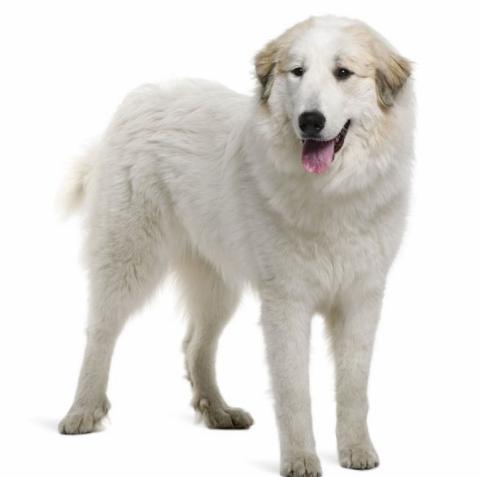I knock softly, then slowly open the door. Teddy goes first, a short leash's length ahead of me. We enter another room for the dying. A man sleeps in one hospital bed, and in another, a woman is asleep. Single beds, I think to myself, and consider the irony. I take another step forward and see a woman, a sitter, in a chair around the corner nearest to the bed where the woman sleeps. The sitter is keeping watch for Mr. and Mrs. Carington, an elderly married couple who are, unusually enough, in hospice together.
Sometimes hospice patients hear us enter and wake. If they do, we make small talk. If they are able, they reach out to pet Teddy. He will then move closer to them, getting their scent, enjoying the attention. If they remain asleep, we linger for a moment, a kind of silent tribute perhaps, before making our exit.
Teddy is a huge, completely white Great Pyrenees. He is also a therapy dog. My wife and I adopted him two years ago. He is four years old, and as is often the case with rescue dogs, his earlier life was not the easiest. He was kept crated for many hours each day, so much so that his bottom teeth are pretty much gone. He kept gnawing on the crate door, but no one would let him out.
Now he has a purpose. Great Pyrenees are often protectors of livestock. Sheep, goats, cows, horses, and even geese, are their charges. My wife Linda and I do not have livestock, so we decided to train Teddy to become a therapy dog. Pyrs like to have a job, and being a therapy dog seems to agree with Teddy.
Neither Mr. nor Mrs. Carington awaken. I make small talk with the sitter. I tell her that I remember the Carington's from the year before, when they both lived on the Alzheimer's unit in this same retirement community between Austin and Houston in rural Texas. We own a small farmhouse nearby. I remember that, when first seeing Teddy then, Mr. Carrington called to his wife Mary to come see the dog. Teddy is something of a spectacle and this is not so unusual. But Mr. Carrington exclaimed, "The dog's tail is like a white bedsheet!" An odd visual description, but this is why I remembered this couple. On that day, Mrs. Carington emerged from their room in the Alzheimer's unit to take a look. She smiled, apparently agreeing with her husband.
Now, Teddy and I leave the Carrington's room, and I have the same thought I often do when visiting these people. I may not see them again. They will be gone. But I also know that someone else will soon take their places. There is a rhythm in this.
As Teddy and I walk down the hall toward another room, to the next person on my list, I think about the Carrington's. Death is a sad thing, yes, but there must be some kind of tender solace in departing life with your partner, your spouse, your husband or wife. Together. Such a strange thing, in fact, and I have not experienced such a thing before in any of our visits.
I look for my own wife, Linda, in the long hallway of disappearing lives. I do not see her, but I know she is with another person who also has a therapy dog. They are visiting someone else.
Alone with Teddy, I think about our own lives. We have been married over forty years, but there have been times when I doubted if we would continue. Six years ago, Linda was diagnosed with breast cancer. In addition to the surgery for that, it was also discovered that she had a thymoma, a tumor lodged between one lung and her heart. That required another surgery prior to the scheduled chemotherapy and radiation treatments. At the time, I had many doubts, as did Linda. What would happen next? What would become of us? But things worked out over the months that followed. Then, when Linda finished her last radiation treatment, I fell ill. I was so weak I was almost falling over. That was when I was diagnosed with colon cancer. Several operations later, I too began chemotherapy. Months later, I finished with it and we both moved forward. Then, a year or so later, our beloved Golden retriever was diagnosed with lymphoma. River was gone in five weeks.
When we said goodbye to River, I think we were also saying goodbye to our personal cancer era. We decided to adopt a new dog, a different breed. We chose Teddy, and he has been a true blessing. A therapy dog, he takes us places we would never have ventured before.
I come to the next room, but before I knock softly on the door, I think of the Carington's again. I think of Linda and I. How on so many nights, we each watched the other suffer. We wondered what we would possibly do if the other departed early. I never considered how time and circumstances might change things, how we might depart together. The odds of this happening are very rare indeed. So in a way I envy the Carrington's. Very few of us will be so lucky.




